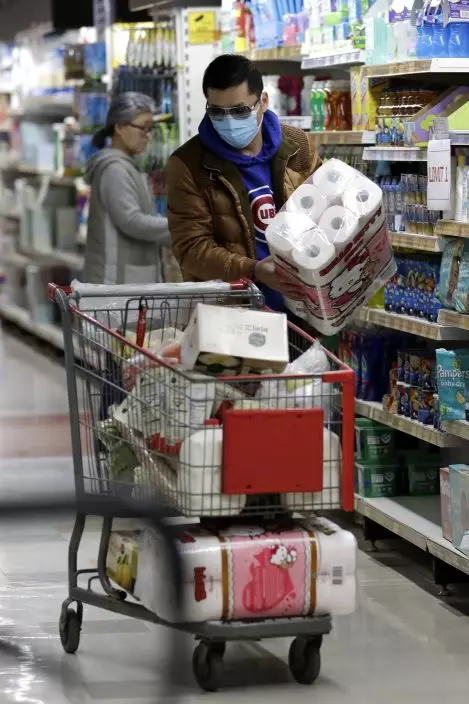Consumer prices fell 0.4% in March, the largest decline in five years, revealing the downward pressure that the coronavirus pandemic is exerting on the cost of gasoline, airfares, hotel rooms and other goods and services.
Last month's decline was the largest monthly drop since January 2015, the Labor Department said Friday. Consumer prices rose a slight 0.1 percent in February.
Energy costs slid 5.8% with gasoline prices falling 10.5%. Airfares plunged 12.6% while hotel and motel prices, dropped 6.8%.

A customer, wearing a protective face mask, places a package of toilet paper into his cart while shopping at a Super H mart grocery store in Niles, Ill., Thursday, March 26, 2020. Amid the COVID-19 pandemic toilet paper producers across the nation are ramping up production and shipping operations to resupply stores wiped out by consumers buying toilet paper and paper towels in bulk. (AP PhotoNam Y. Huh)
The travel industry has been hit hard by the shutdown of much of the country because of the coronavirus.
Consumer prices are up a modest 1.5% over the past year while core inflation, which excludes volatile food and energy, has risen 2.1% over the last 12 months.
Economists expect more price declines ahead with large parts of the economy shut down and millions out of work. They believe the country has already entered a steep recession and the falling prices raise the prospect of disinflation.

Seminole Hard Rock Hotel & Casino is shown, Friday, March 20, 2020, in Hollywood, Fla. The Seminole Tribe closed its casinos, the latest virus-related closures affecting a state that is heavily dependent on tourism and consumer spending to pay its bills. (AP PhotoWilfredo Lee)
When producers lack pricing power, it can create a circular pattern in which consumers put purchases on hold, driving prices down further. Consumer activity accounts for 70% of all U.S. economic activity and a sustained chill in spending can damage the overall economy.
Kathy Bostjancic, chief U.S. financial economist at Oxford Economics, said the concerns about disinflation was one of the reasons the Federal Reserve has moved so forcefully to combat the current crisis.
Chris Rupkey, chief financial economist at MUFG Union Bank in New York, said, “There's deflation in the air and more downward pressure on prices is imminent with economic demand plummeting this quarter.”

A shopper leaves as others line up to enter a Costco store, Friday, March 20, 2020, in Tacoma, Wash. Consumers continued to stock up on food and other items as officials urged people to stay at home to slow the spread of the new coronavirus. (AP PhotoTed S. Warren)
Economists are already predicting that the economy could fall by as much as 30% at an annual rate this quarter. The hope is that the downturn will be short as economic activity rebounds sharply once the virus is contained.
The CPI report said that energy prices fell 5.7% from a year ago, while food prices are up 1.9% after a 0.3% gain in March.
Clothing costs tumbled a sharp 2% in March, while the price of new vehicles fell 0.4%.


